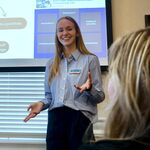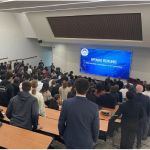

Less than a year after traveling into the rainforest to study bats and frogs in Panama, Samantha Siomko ’17, a Biology major from Lititz, Pennsylvania, headed down under to study in Australia for a semester.
Siomko said she’s always loved animals, wildlife, and hiking. Today that translates into an interest in animal behavior research, although if you ask, she will tell you she’s simply following projects that sound interesting—and perhaps opportunities to catch sight of the elusive platypus. But that’s not the only reason she decided to study in Australia.

Siomko in Australia.
In Panama, Siomko was researching the predatory behavior of bats, so when she was preparing to leave for Australia she knew she was interested in learning more about how local scientists captured and released their bats back into the wild. While there, she had the opportunity to work at The Tolga Bat Hospital in Atherton, Queensland.
“I worked with the spectacled flying fox, which is a threatened species that has a bad stigma in Australia,” said Siomko. “My project focused on how the infant flying-foxes were raised by caregivers and if contact with humans affected their ability to survive in the wild after being released.”
In addition to research opportunities, the program included traveling to the rain forest and the Great Barrier Reef to study the ecology of Australia as well as spending time with an Aborigine community to learn more about the culture. After the semester ended, Siomko stayed in Australia for another three weeks to work in Cradle Mountain, Tasmania, with Tasmanian devils and quolls.
“This was more just for fun, and my job mainly consisted of taking care of the animals and maintaining the park instead of research,” she said, “but I learned a lot about how animal sanctuaries like that are run.”
Of her research experiences Siomko said she learned that science takes time and is often not glamorous, as fun and interesting as going out into the field can be.
“I always thought studying animal behavior was going to be a lot of going out into the field, but there’s also a lot of lab work that goes with that,” she said. “It was nice to learn early on what’s really required of you as a scientist.”
Siomko’s first foray into research occurred before her work with bats, however, when she enrolled in the Phage Biology course, a class designed to get first-year students involved in hands-on scientific research at the very beginning of their college careers.
“One of the reasons I came to Gettysburg is because I was accepted into that course,” she said. (Today, Phage Biology—sometimes called the “virus hunting” course—is led by Prof. Nikki Shariat, which you can read more about here.)
Siomko said that experience is what influenced her to continue pursuing her interest in research and ultimately what led her to Panama.
“I learned there was a lot I didn’t know, but also that there was a lot out there I wanted to know. I knew I wanted to keep going,” she said.

So she asked her professors—including her advisor, Biology Prof. Véronique Delesalle—for advice, and they connected her with newly hired Biology Prof. Paula “Alex” Trillo, who immediately brought Siomko on as her lab’s first peer learning associate, supporting the bat research.
In addition to her interests and activities in the scientific community, Siomko is an accomplished writer, having won several statewide creative writing contests. She also writes for the money, tech, and science section of The Gettysburgian. Although she doesn’t yet know where the amalgamation of these experiences will lead her, Siomko continues to do what any good scientist should: experiment.
“With a liberal arts education, I’m not just taking science courses—I can take a variety of courses. I took an Africana studies course and a class about feminism and literature,” said Siomko. “In the end, all of these things come back to science. So many different people are impacted by the environment—why is conservation important? I can make my own connections between the two.”


